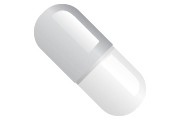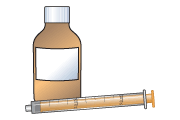Rifampicin for treatment of tuberculosis
This leaflet is for parents and carers about how to use this medicine in children. Our information may differ from that provided by the manufacturers, because their information usually relates to adults. Read this leaflet carefully. Keep it somewhere safe so that you can read it again.
It is essential that your child takes all their medicines daily, as explained by the doctor, and continues until the doctor tells you to stop.
Name of medicine
Rifampicin (rif-AMP-i-cin)
Brand names: Rifadin, Rimactane
Rifampicin also comes in tablets mixed with other drugs used to treat TB, such as Rifater and Rifinah
Why is it important for my child to take Rifampicin?
The bacteria that cause TB are hard to kill. Your child will have to take up to four medicines for at least 3-6 months.
Rifampicin is one of these key medicines.
Your child may not necessarily have symptoms from the TB infection. Any symptoms should start to improve soon after starting treatment.
You must continue to give the medicine until your doctor tells you to stop. If you stop too soon, or your child does not take the medicine as your doctor has told you to, the bacteria may not be killed and TB disease may develop. It is also possible that the bacteria will become resistant to Rifampicin, which means that they will no longer work. This may mean that other stronger drugs will have to be used, or that if TB disease does develop, it will be much harder to treat.
What is Rifampicin available as?
- Capsules: 150 mg, 300 mg
- Liquid medicine: 100 mg per 5 mL; this syrup contains sucrose
When should I give Rifampicin
Rifampicin is usually given once each day. This can be in the morning or the evening.
Give it at about the same time each day so that this becomes part of your child’s daily routine, which will help you to remember.
You need to give Rifampicin to your child when their stomach is empty. Give it 30 minutes before a meal or 2 hours after a meal.
How much should I give?
Your doctor will work out the amount of Rifampicin (the dose) that is right for your child. This is usually worked out from their weight. The dose will be shown on the medicine label.
It is important that you follow your doctor’s instructions about how much to give.
How should I give Rifampicin?

Capsules
- Capsules should be swallowed with a glass of water or juice, but not milk. Your child should not chew the capsule.

Liquid medicine
- Shake the medicine well.
- Measure out the right amount using an oral syringe or a medicine spoon. You can get these from your pharmacist. Do not use a kitchen teaspoon as it will not give the right amount.
You need to give Rifampicin to your child when their stomach is empty. Give it 30 minutes before a meal or 2 hours after a meal.
When should the medicine start working?
Your child will start to feel better after taking the TB medicines for about 2 weeks and should have fewer symptoms. They must continue to take the drugs every day until the doctor says to stop treatment. This will be for at least 3-6 months
What if my child is sick (vomits)?
- If your child is sick less than 30 minutes after having a dose of Rifampicin, give them the same dose again.
- If your child is sick more than 30 minutes after having a dose of Rifampicin, do not give them another dose. Wait until the next normal dose.
If your child is sick again, seek advice from your family doctor, nurse, pharmacist, or hospital. They will decide what to do based on your child’s condition and the specific medicine involved.
What if I forget to give it?
Tell your nurse/doctor if you miss a dose.
Never give a double dose of Rifampicin.
What if I give too much?
If you think you may have given your child too much Rifampicin, contact your doctor or local NHS services (details at end of leaflet) or take your child to hospital. Have the medicine container or packaging with you, even if it is empty. This will be useful to the doctor.
It may be dangerous to give too much Rifampicin.
Are there any possible side effects?
We use medicines to make our children better, but sometimes they have other effects that we don’t want (side effects).
Side effects you must do something about
If your child gets swelling of the face, lips or tongue, a skin rash or itching, has difficulty breathing or has a fit (seizure), take them to hospital or call for an ambulance straight away, as they may be allergic to Rifampicin.
If your child develops any of the following, take them to your doctor or hospital straight away:
- severe dizziness or faints
- swollen face, stomach, arms or legs, which may mean they have water build up (fluid retention)
- yellowing of skin and/or whites of the eyes
- sores or blisters on the skin or in the mouth
- passing only small amounts of urine (wee) or none at all
- bleeding from the nose, gums or throat, or blood in the urine (wee).
Other side-effects you need to know about
Your child may get the following symptoms when they first start taking rifampicin. They should wear off as your child’s body gets used to the medicine. If they are still a problem after a week or so, contact your doctor or TB nurse for advice.
- They may get stomach cramps, feel sick or be sick (vomit) or get diarrhoea.
- They may get headaches, feel drowsy (sleepy) or seem confused.
- They may get pains in the bones or muscles.
- They may sweat more than normal or flush (where the skin goes red).
- Their heart beat may feel stronger and less regular than normal (they may say it feels fluttery) and they may feel dizzy, light-headed or may even faint.
- Your child may get watery eyes and the edges of the eye lids may get red and sore. This should wear off. If your child has any pain in their eyes, or cannot see properly, contact your doctor straight away.
- Some girls have problems with their periods when they start taking rifampicin. The periods may become irregular, and they may get some light bleeding (spotting) between periods. Their cycle should return to normal after 2-4 months. If it doesn’t, contact your doctor or TB nurse.
- Your child should not wear soft contact lenses whilst taking rifampicin, as they are likely to become stained.
Rifampicin may make your child’s urine (wee), faeces (poo), saliva (spit), mucus (phlegm), sweat or tears turn an orange-red colour. This is not harmful and will go when your child stops taking this medicine. The red colour in tears may last for some time after your child has stopped taking Rifampicin, and may stain clothes.
There may sometimes be other side effects that are not listed above. If you notice anything unusual and are concerned, contact your doctor. You can report any suspected side effects to a UK safety scheme at mhra.gov.uk/yellowcard
Can other medicines be given at the same time as Rifampicin?
- You can give your child medicines that contain paracetamol or ibuprofen, unless your doctor has told you not to.
- Rifampicin should not be taken with some medicines. Tell your doctor or pharmacist about any other medicines your child is taking before giving Rifampicin.
Check with your doctor or pharmacist before giving any other medicines to your child. This includes herbal and complementary medicines.
The oral contraceptive pill does not work properly during treatment with Rifampicin so your daughter should use other forms of contraception if she is sexually active.
Is there anything else I need to know about this medicine?
It is important that your child takes their TB medicines every day. You may find a calendar useful, so that you can cross off the days when you give the medicines.
You should also keep all your clinic appointments as your doctor or TB nurse needs to check how your child is doing.
General advice about medicines
- Try to give medicines at about the same times each day, to help you remember.
- Only give this medicine to your child. Never give it to anyone else, even if their condition appears to be the same, as this could do harm.
- Make sure that you always have enough medicine. Order a new prescription at least 2 weeks before you will run out.
- Make sure that the medicines you have at home have not reached the ‘best before’ or ‘use by’ date on the packaging. Give old medicines to your pharmacist to dispose of.
If you think someone else may have taken the medicine by accident, contact your doctor straight away.
Where should I keep this medicine?
- Keep the medicine in a cupboard, away from heat and direct sunlight.
- It is important to keep Rifampicin somewhere where it cannot get damp.
- Keep the medicine in the container it came in.
- Make sure that children cannot see or reach the medicine.
Who to contact for more information?
Your child’s doctor, pharmacist or nurse will be able to give you more information about Rifampicin and about other medicines used to treat TB.
England: NHS 111
Tel 111
www.nhs.ukScotland: NHS 24
Tel 111
www.nhs24.scotNorthern Ireland: NI Direct
Wales: NHS 111 Wales
Tel 111
www.111.wales.nhs.ukBritish Lung Foundation
03000 030 555
www.blf.org.uk/support-for-you/childrenCopyright disclaimer
Version [2]. © NPPG, RCPCH and WellChild, all rights reserved. Review by September 2017.
The primary source for the information in this leaflet is the British National Formulary for Children. For details on any other sources used for this leaflet, please contact us through our website, www.medicinesforchildren.org.uk.
We take great care to make sure that the information in this leaflet is correct and up-to-date. However, medicines can be used in different ways for different patients. It is important that you ask the advice of your doctor or pharmacist if you are not sure about something. This leaflet is about the use of these medicines in the UK, and may not apply to other countries. The Royal College of Paediatrics and Child Health (RCPCH), the Neonatal and Paediatric Pharmacists Group (NPPG), WellChild and the contributors and editors cannot be held responsible for the accuracy of information, omissions of information, or any actions that may be taken as a consequence of reading this leaflet.
